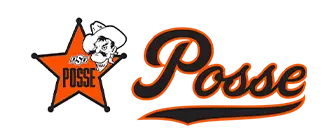Oklahoma State University Athletics

Chester Pittman - The Right Man for the Right Time
February 01, 2021 | Cowboy Football
STILLWATER – It's amazing what a seemingly ordinary person can accomplish.
Chester Pittman was the son of a stone mason. He grew up on a farm in Wewoka, showed hogs and washed milk bottles and later became one of the most important pioneers at Oklahoma State University.
From 1959-60, Pittman was targeted by opposing fans and endured discrimination and outright racism en route to becoming OSU's first Black football letterman. And about 50 years after his playing career ended, he was asked what he wished his legacy would be.
"I'm more interested in how I treat people," Pittman said. "I think if I do that, people are going to treat me how I want to be treated, because of how I treated them."
A mindset like that enabled Pittman to make history, and in doing so, shape a future for so many after him.
Sure, he was a standout performer on the gridiron, but at a time when integration was a contentious idea for many, it took a special kind of person — a special, ordinary kind of person — to persevere and do something that would truly impact lives for decades to come.
"He was the man for the time," Dick Soergel, OSU's quarterback from 1959-60, said of Pittman. "He could fit into a team setting. He was humble enough and yet still aggressive enough. He could fit in. Everybody liked Chester. He didn't have any enemies. You enjoyed being with him."
------
In a 2010 interview that was part of Oklahoma State's oral history project, Pittman recalled specific instances of discrimination that happened during college. One came on a road trip to play Houston, where a hotel in Galveston would not allow Pittman to eat with his teammates in the main dining area. Rather, he was to eat in the kitchen. Teammates offered to join him, but Pittman declined.
"I wasn't going to ask them to come in with me because I thought it was an insult for me to come in there, much less for me to bring other people," Pittman said. "If that was the way they wanted to do it, as long as I was getting the same thing the team had to eat, it didn't make a big difference. I wasn't in any contest with anybody. I said, 'Hey, just do what you have to do.'"
Another came in Little Rock, Arkansas, the day before Pittman and the Cowboys were to play the University of Arkansas. OSU's buses arrived at the team's downtown hotel, but while the rest of the group got off, Pittman remained on the bus because the hotel would not allow him to stay the night.
"We didn't know what was going on, but we soon found out that Chester couldn't stay in the hotel with us. They had to take him to a hotel for Blacks. We really felt bad about it," Soergel said. "We were trying to console Chester, and I remember he laughed at us and said, 'Guys, you know me, I'll have a lot more fun than you will.' He just could handle things like that."
On game day, OSU assistant coach Harry Buffington arranged for a taxi cab to pick up Pittman and bring him back to the team.
When the Cowboys arrived to the stadium for the game itself, a hostile environment awaited Pittman.
"I'll never forget how bad it was when he got out on the football field," Soergel continued. "I think he may have been the first Black player who ever played at War Memorial Stadium. The crowd booed him. Awful. Chester just endured it."
------
Pittman's upbringing had a lot to do with his level of endurance.
"My mom and dad, neither one had a high school diploma. They insisted that all the kids at least got their high school diploma," he said. "They did not put up with any nonsense. They were all about education. Getting a high school diploma was what we were expected to do."
While his parents did not specifically mandate a college degree, they did impart a larger concept — the value of education. That sparked a desire in Pittman to go beyond what they required and get a college degree. It also helped him view things from a wider perspective. Pittman was not the only Black player to come into the Oklahoma State football program in the fall of 1957. He was, however, the only one who lasted beyond one semester.
"I understood why I was at school, and I knew I needed the scholarship," Pittman said. "I knew I wanted to better myself and have a good job. I had worked as a youngster. I knew what I was doing, I knew what my daddy did, and I knew that wasn't going to get me anywhere other than getting me by. I wanted to do more than get by. I wanted to be a homeowner. I wanted to have a family, and I wanted to have things that I could say I had some ownership in."
In addition to having a clear purpose, Pittman was also humble enough to recognize how fortunate he was to have the opportunity he did at Oklahoma State.
During his prep days, Pittman attended all-Black Wewoka Douglass High School, and despite being a standout on the field, was not recruited by any major colleges. In his senior year at Douglass, schools in Oklahoma were just beginning to integrate. Interestingly, Douglass and all-white Wewoka High School were not integrated in the classrooms, but did combine their football teams. Pittman was one of 11 Douglass seniors who would walk a quarter-mile to Wewoka HS after school to play football.
"It was a godsend," Pittman said. "We didn't have any scouts from major or even minor universities that came to Douglass my junior year to come recruit, so I didn't know anything about those guys. Once I started playing (at Wewoka HS), then I started getting questionnaires from Oklahoma and Nebraska and Oklahoma State."
He chose Oklahoma State, and the rest is history.
------
After graduating from OSU, Pittman enriched the lives of countless young people during a long career working in education.
In 2010, the Oklahoma State Black Alumni Association presented him with its Trailblazer Award.
Pittman passed away in December of 2020, but his wife, Donna, shared additional insight as to why he was the right person at the right time to become Oklahoma State's first Black football letterman.
"He didn't play games with people," she said. "He did what he was supposed to do. He was always positive about the things he did. If he was confronted with something, he dealt with it — he didn't ignore it."
Pittman's place in Oklahoma State football history is secured. He was a special kind of person — a special, ordinary kind of person who did an amazing thing in becoming Cowboy football's first Black letterman.
Chester Pittman was the son of a stone mason. He grew up on a farm in Wewoka, showed hogs and washed milk bottles and later became one of the most important pioneers at Oklahoma State University.
From 1959-60, Pittman was targeted by opposing fans and endured discrimination and outright racism en route to becoming OSU's first Black football letterman. And about 50 years after his playing career ended, he was asked what he wished his legacy would be.
"I'm more interested in how I treat people," Pittman said. "I think if I do that, people are going to treat me how I want to be treated, because of how I treated them."
A mindset like that enabled Pittman to make history, and in doing so, shape a future for so many after him.
Sure, he was a standout performer on the gridiron, but at a time when integration was a contentious idea for many, it took a special kind of person — a special, ordinary kind of person — to persevere and do something that would truly impact lives for decades to come.
"He was the man for the time," Dick Soergel, OSU's quarterback from 1959-60, said of Pittman. "He could fit into a team setting. He was humble enough and yet still aggressive enough. He could fit in. Everybody liked Chester. He didn't have any enemies. You enjoyed being with him."
------
In a 2010 interview that was part of Oklahoma State's oral history project, Pittman recalled specific instances of discrimination that happened during college. One came on a road trip to play Houston, where a hotel in Galveston would not allow Pittman to eat with his teammates in the main dining area. Rather, he was to eat in the kitchen. Teammates offered to join him, but Pittman declined.
"I wasn't going to ask them to come in with me because I thought it was an insult for me to come in there, much less for me to bring other people," Pittman said. "If that was the way they wanted to do it, as long as I was getting the same thing the team had to eat, it didn't make a big difference. I wasn't in any contest with anybody. I said, 'Hey, just do what you have to do.'"
Another came in Little Rock, Arkansas, the day before Pittman and the Cowboys were to play the University of Arkansas. OSU's buses arrived at the team's downtown hotel, but while the rest of the group got off, Pittman remained on the bus because the hotel would not allow him to stay the night.
"We didn't know what was going on, but we soon found out that Chester couldn't stay in the hotel with us. They had to take him to a hotel for Blacks. We really felt bad about it," Soergel said. "We were trying to console Chester, and I remember he laughed at us and said, 'Guys, you know me, I'll have a lot more fun than you will.' He just could handle things like that."
On game day, OSU assistant coach Harry Buffington arranged for a taxi cab to pick up Pittman and bring him back to the team.
When the Cowboys arrived to the stadium for the game itself, a hostile environment awaited Pittman.
"I'll never forget how bad it was when he got out on the football field," Soergel continued. "I think he may have been the first Black player who ever played at War Memorial Stadium. The crowd booed him. Awful. Chester just endured it."
------
Pittman's upbringing had a lot to do with his level of endurance.
"My mom and dad, neither one had a high school diploma. They insisted that all the kids at least got their high school diploma," he said. "They did not put up with any nonsense. They were all about education. Getting a high school diploma was what we were expected to do."
While his parents did not specifically mandate a college degree, they did impart a larger concept — the value of education. That sparked a desire in Pittman to go beyond what they required and get a college degree. It also helped him view things from a wider perspective. Pittman was not the only Black player to come into the Oklahoma State football program in the fall of 1957. He was, however, the only one who lasted beyond one semester.
"I understood why I was at school, and I knew I needed the scholarship," Pittman said. "I knew I wanted to better myself and have a good job. I had worked as a youngster. I knew what I was doing, I knew what my daddy did, and I knew that wasn't going to get me anywhere other than getting me by. I wanted to do more than get by. I wanted to be a homeowner. I wanted to have a family, and I wanted to have things that I could say I had some ownership in."
In addition to having a clear purpose, Pittman was also humble enough to recognize how fortunate he was to have the opportunity he did at Oklahoma State.
During his prep days, Pittman attended all-Black Wewoka Douglass High School, and despite being a standout on the field, was not recruited by any major colleges. In his senior year at Douglass, schools in Oklahoma were just beginning to integrate. Interestingly, Douglass and all-white Wewoka High School were not integrated in the classrooms, but did combine their football teams. Pittman was one of 11 Douglass seniors who would walk a quarter-mile to Wewoka HS after school to play football.
"It was a godsend," Pittman said. "We didn't have any scouts from major or even minor universities that came to Douglass my junior year to come recruit, so I didn't know anything about those guys. Once I started playing (at Wewoka HS), then I started getting questionnaires from Oklahoma and Nebraska and Oklahoma State."
He chose Oklahoma State, and the rest is history.
------
After graduating from OSU, Pittman enriched the lives of countless young people during a long career working in education.
In 2010, the Oklahoma State Black Alumni Association presented him with its Trailblazer Award.
Pittman passed away in December of 2020, but his wife, Donna, shared additional insight as to why he was the right person at the right time to become Oklahoma State's first Black football letterman.
"He didn't play games with people," she said. "He did what he was supposed to do. He was always positive about the things he did. If he was confronted with something, he dealt with it — he didn't ignore it."
Pittman's place in Oklahoma State football history is secured. He was a special kind of person — a special, ordinary kind of person who did an amazing thing in becoming Cowboy football's first Black letterman.
Doug Meacham Previews Oklahoma State vs. Texas Tech - Cowboy Football News Conference (10-20-2025)
Tuesday, October 21
Steve Lutz on OSU Win Over Auburn and What's Next For Cowboy Hoops - 10-20-25 News Conference
Monday, October 20
Doug Meacham Previews Oklahoma State vs. Iowa State - Cowboy Football News Conference (11-24-2025)
Monday, October 20
Doug Meacham Previews Oklahoma State vs. UCF - Cowboy Football News Conference (11-17-2025)
Monday, October 20










